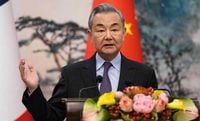In a significant diplomatic gesture, Chinese Foreign Minister Wang Yi announced on Tuesday, April 1, 2025, that China is prepared to play a "constructive role" in ending the ongoing war between Russia and Ukraine while simultaneously defending Moscow's rights. This statement came ahead of his scheduled meeting with Russian Foreign Minister Sergey Lavrov in Moscow.
Wang made his remarks to the Russian news agency RIA Novosti, emphasizing that China is ready to engage with the international community to help resolve the crisis that has persisted for over three years. "Taking into account the concerns of all parties, China is willing to play a constructive role with the international community in resolving the ongoing crisis," he stated.
The Chinese minister's official visit to Russia, which runs from March 31 to April 2, 2025, reflects the strengthening ties between Beijing and Moscow, particularly in the wake of the Russian invasion of Ukraine that began in 2022. During this visit, Wang is also expected to meet with Russian President Vladimir Putin, as confirmed by the Kremlin.
In recent months, China has positioned itself as a mediator in the conflict, despite its close ties with Russia. This approach aims to showcase Beijing's commitment to a peaceful resolution while balancing its relationship with Moscow. The backdrop of this diplomatic effort includes a recent rejection by Russian President Vladimir Putin of a joint American-Ukrainian proposal for a 30-day ceasefire aimed at facilitating negotiations.
President Trump, addressing the media at the White House, expressed his belief that Putin is feeling the strain of the ongoing war. "I want to make sure that he is satisfied with his commitments," Trump said, referring to the necessity for Putin to adhere to any agreements made regarding the conflict. He indicated confidence that Putin would fulfill his obligations, highlighting the complexities of the international diplomatic landscape surrounding the war.
As the situation continues to evolve, the dynamics between the United States, Ukraine, and Russia remain tense. Ukraine's President Volodymyr Zelensky is actively seeking to negotiate a peace operation, yet the path to resolution appears fraught with challenges. The ongoing conflict has drawn widespread international attention, with various nations weighing in on the best course of action.
While Wang Yi's comments suggest a willingness to engage constructively, they also come at a time when the geopolitical stakes are particularly high. The military and commercial relationship between Russia and China has deepened significantly since the onset of the war, further complicating the international response to the crisis.
In the broader context, the implications of Wang's visit and the discussions with Lavrov could have far-reaching effects on the future of the conflict. As both countries navigate their respective interests, the potential for a diplomatic breakthrough remains uncertain.
As Wang Yi meets with Lavrov, the world watches closely, hoping for signs of progress in an area that has seen little resolution. The outcomes of these discussions may not only influence the immediate situation in Ukraine but also reshape the global balance of power in the years to come.
In conclusion, the meeting between Wang and Lavrov represents a critical juncture in the ongoing conflict, with the potential to alter the trajectory of the war. As both nations continue to assert their positions, the international community remains on alert, awaiting the developments that may arise from this pivotal diplomatic engagement.





